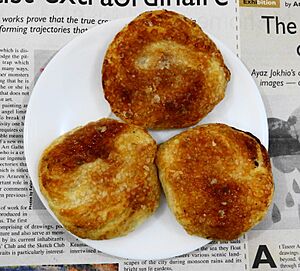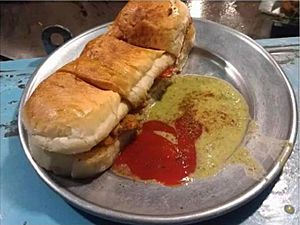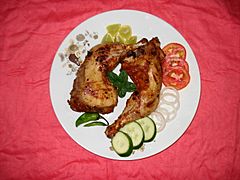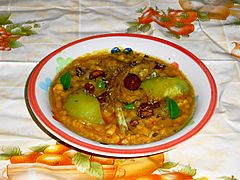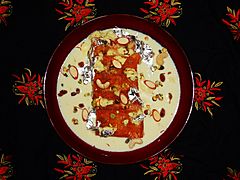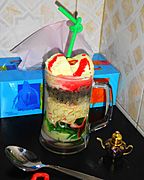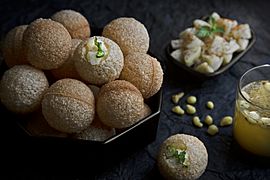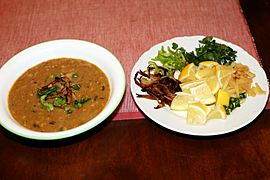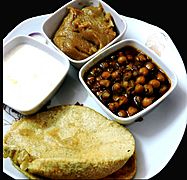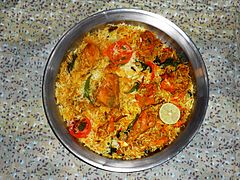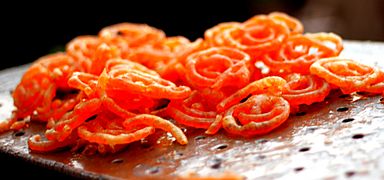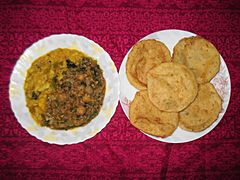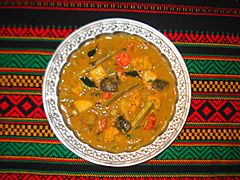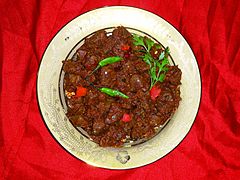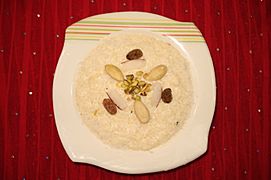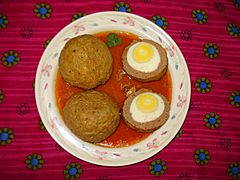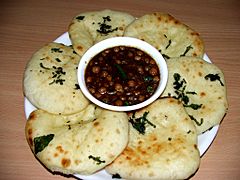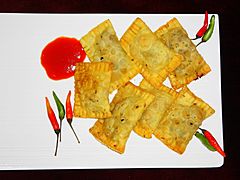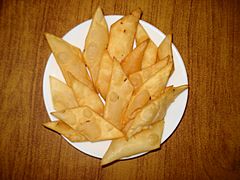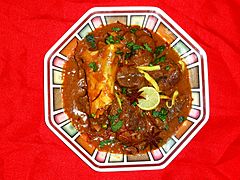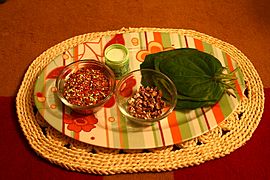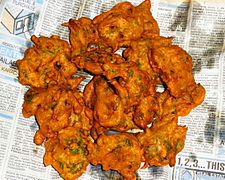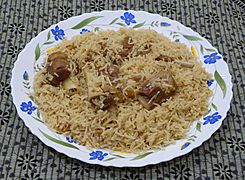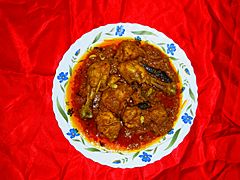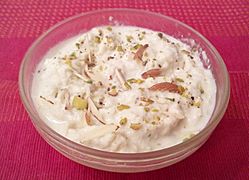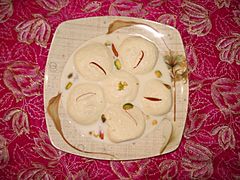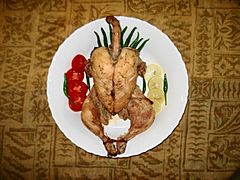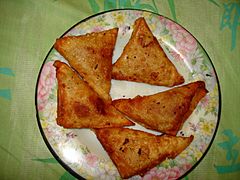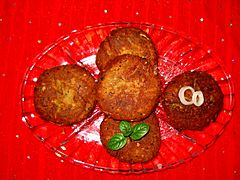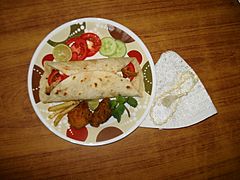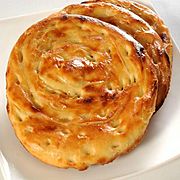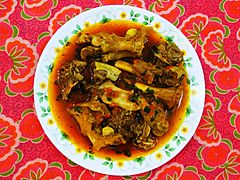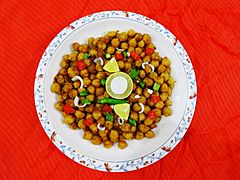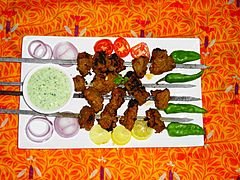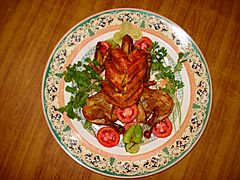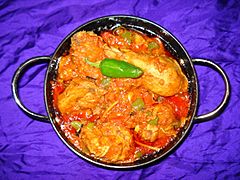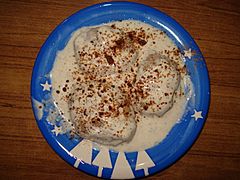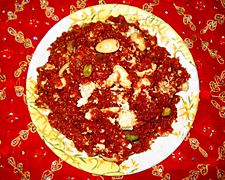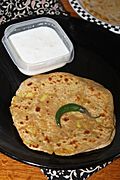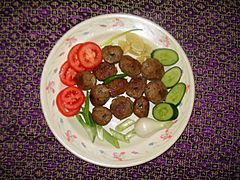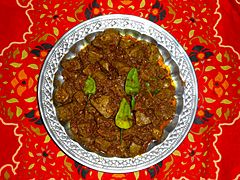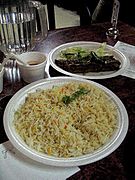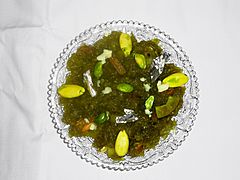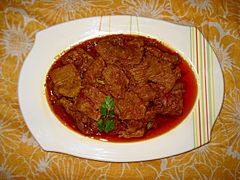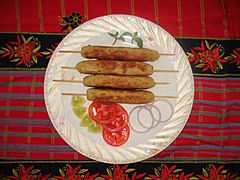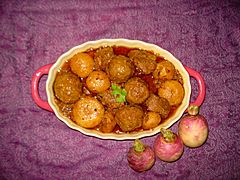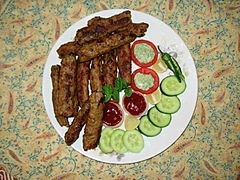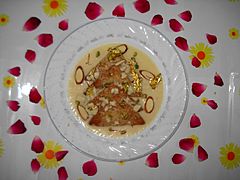Cuisine of Karachi facts for kids
Karachi cuisine is the delicious food you can find mostly in the city of Karachi, Sindh, Pakistan. It's a mix of many different food styles because people from all over Pakistan, and even other countries, have come to live in Karachi. This makes Karachi a "melting pot" of cultures and flavors.
The food in Karachi is greatly influenced by the Muhajir people. These are people who moved to Karachi from different parts of British India after Pakistan became independent in 1947. Many Urdu-speaking Muslims settled here, bringing their traditional recipes and drinks with them.
Karachi's food is famous for blending cultures. Many different empires and groups of people have lived in this big city. Because of this, many types of food have influenced Karachi's cooking style. Other Pakistani cuisines, like Sindhi cuisine, Punjabi cuisine, and Pashtun cuisine, have also added to Karachi's unique flavors.
How History Shaped Karachi's Food
The arrival of Islam in South Asia greatly changed the local food. You can see influences from Central Asia, South Asia, and the Middle East in Pakistani food everywhere.
Muslims do not eat pork or drink alcohol. They follow special food rules called Halal. Because of this, Pakistani cooking focuses on other foods. These include Beef, Lamb, Chicken, Fish, and many different vegetables. They also use traditional Fruit and dairy products.
Popular Dishes to Try
Karachi has a huge variety of dishes. Here are some of the most popular ones:
- Aloo cholay: A tasty dish made with potatoes and chickpeas.
- Aloo chaat: A spicy and tangy potato snack.
- Aloo paratha: A flatbread stuffed with spiced potatoes.
- Bun kebab: A popular street food, like a burger with a special patty.
- Chicken karahi: A spicy chicken curry cooked in a special pan called a karahi.
- Chicken tikka: Small pieces of chicken marinated and grilled.
- Falooda: A sweet, cold dessert drink with noodles, jelly, and ice cream.
- Haleem: A thick stew made from wheat, barley, meat, and lentils.
- Halwa poori: A breakfast dish with sweet semolina (halwa) and deep-fried bread (poori).
- Hyderabadi biryani: A flavorful rice dish cooked with meat and spices.
- Jalebi: A sweet, crispy, and syrupy pretzel-like dessert.
- Kheer: A creamy rice pudding.
- Nihari: A slow-cooked meat stew, often eaten for breakfast. It's a national dish in Pakistan.
- Paan: A traditional betel leaf chew, often eaten after meals.
- Pakora: Deep-fried fritters made with vegetables or meat.
- Pulao: A rice dish cooked with broth, meat, or vegetables.
- Qorma: A rich, creamy meat curry.
- Samosa: A fried or baked pastry with a savory filling, like spiced potatoes or meat.
- Seekh kebab: Spiced minced meat grilled on skewers.
- Shawarma: Sliced meat, often chicken or beef, served in a flatbread.
- Sheermal: A sweet, saffron-flavored flatbread.
- Siri paya: A rich stew made from trotters (feet) of goat or lamb.
Here are some other delicious dishes you might find:
- Ajwain Paratha
- Anday wala Burger (Egg Burger)
- Chana Chaat
- Boti Kebab
- Dahi Baray
- Gajar Ka Halwa
- Gola Kebab
- Kaleji (liver) Kabab
- Kebab roll
- Lamb karahi
- Lamb Tikka
- Pasanday
- Reshmi Kebab
- Rumali Roti
- Shab Daig
- Tandoori Paratha
Gallery
 | Aurelia Browder |
 | Nannie Helen Burroughs |
 | Michelle Alexander |


